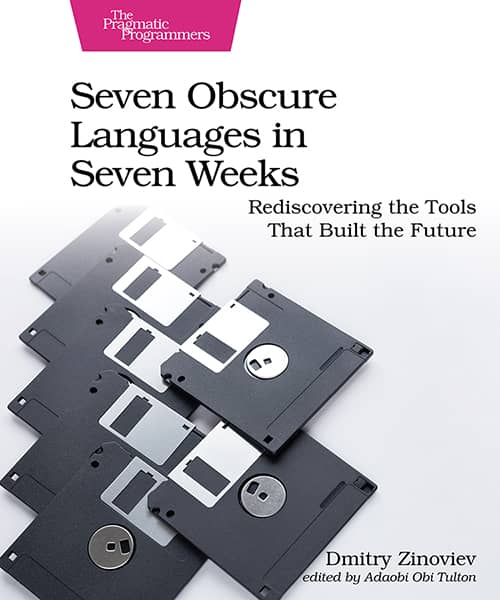Seven Obscure Languages in Seven Weeks (Pragmatic Bookshelf)
PragmaticBookshelf
Dmitry Zinoviev @aqsaqal
Edited by Adaobi Obi Tulton @aotulton
Immerse yourself in the intricate world of forgotten programming languages with Seven Obscure Languages in Seven Weeks. This comprehensive guide serves as a bridge to understanding and revitalizing legacy code, offering invaluable insights into the evolution of programming. With hands-on tutorials spanning languages from Forth and Simula to SNOBOL and m4, readers are equipped to maintain older systems and gain a broader perspective on problem-solving techniques. Whether you are a seasoned developer, a software historian, or just curious about the roots of modern coding, this book illuminates the rich tapestry of programming’s past and sheds light on its present and future.
Venture into overlooked and long-forgotten programming languages that once stood at the forefront of technological innovation. From the stack-oriented design of Forth to the early object-oriented experiences in Simula, bridge the ever-widening chasm between contemporary code and legacy systems. If you find yourself ensnared by the challenges of updating or maintaining older systems, this book is the lifeline.
Unravel the fabric of seven programming languages by following practical tutorials and building small applications. Find out how Simula led to C++, what made APL so powerful, and why we still use m4 even to this day. Along the way, you’ll broaden your problem-solving horizons, and develop diverse approaches to computation that still ripple through today’s coding landscape. By the final chapter, you won’t merely possess historical knowledge, you’ll be equipped with production ready skills capable of tackling projects that interface with legacy code.
Trace the evolutionary lineage of programming to gain a predictive edge in anticipating future trends. After all, this isn’t just a nostalgic trip—it’s a roadmap to the past, present, and future of coding.
Dmitry Zinoviev is a professor of Computer Science at Suffolk University in Boston and has a dual degree in Physics and Computer Science. He is passionate about modern C and Python programming, complex network analysis, computational social science, digital humanities, computer simulation and modeling, and software archeology and retrocomputing. He is the author of the first modern implementation of the Starset language.
- Full details: Seven Obscure Languages in Seven Weeks: Rediscovering the Tools That Built the Future by Dmitry Zinoviev
- View this book’s portal and details on how to post errata and suggestions here.
Don’t forget you can get 35% off with your Devtalk discount! Just use the coupon code “devtalk.com" at checkout ![]()
Latest Threads About This Book

Most Active This Week

Most Active This Month

Most Active This Year

Most Active Last Three Years

Most Active Over Three Years

Latest in Seven Obscure Languages in Seven Weeks
Get money off!

The Pragmatic Bookshelf
35% off any eBook
Use the coupon code "devtalk.com" to get 35% off any eBook published by PragProg!
Filter by Type:
Related Portals
-
None added yet










